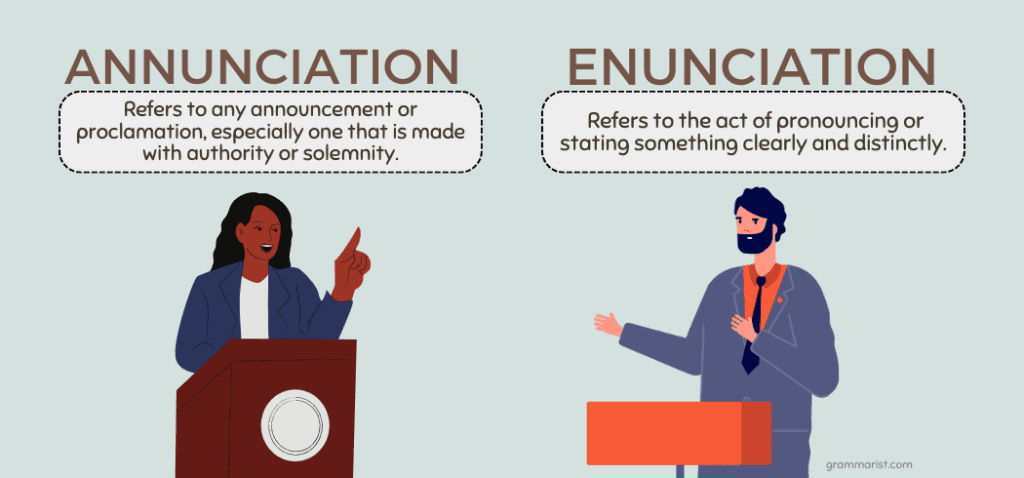“Annunciation” and “enunciation” are two fairly common English terms that are often confused because they sound so similar and even have some overlapping meanings. However, I assure you, they’re actually quite distinct and have different connotations and uses. I’ll go over everything you should know about using these terms.
Annunciate Meaning
“Annunciation” is a noun that refers to the announcement or proclamation of something, especially the announcement that the angel Gabriel gave to the Virgin Mary that she would birth the son of God, Jesus Christ. That’s a pretty recognizable event, right? This occasion, known as the Annunciation, is an important celebration in the Christian faith and is marked by the Feast of the Annunciation on March 25.
The way I remember it is to think of the word announce. Announce = announce.
The term “annunciation” can also be used more broadly to refer to any announcement or proclamation, especially one that is made with authority or solemnity.
Examples of Annunciation Used in a Sentence
Here are a few examples of “annunciation” in a sentence:
- The bishop made a solemn annunciation at the church service, announcing the news of the Pope’s appointment.
- The queen’s annunciation of the birth of a new prince was met with great joy and celebration.
- The president’s annunciation of a new policy was met with mixed reactions from the public.
- Don’t be late for the morning annunciations from the principal.
What Does Enunciation Mean?
Now, let’s look at the word “enunciation.” It is a noun that refers to the way in which something is pronounced or articulated, especially the clarity and distinctness of speech.
It also refers to the act of pronouncing or stating something clearly and distinctly. I remember having a teacher in high school that enunciated long words to the point where it got annoying.
How to Pronounce Enunciate
That’s easy! Just say, uh-nuhn-see-ayt.
Using “Enunciation” in a Sentence the Right Way
Here are a few examples I came up with that show how to use “enunciation” in a sentence.
- The actor was praised for her excellent enunciation, which made every word of the play easy to understand.
- The teacher gave her students exercises to improve their enunciation and diction.
- The public speaker was criticized for poor enunciation, which made it difficult to understand what he was saying.
Enunciation as a Verb
“Enunciation” can definitely be used as a verb! It means to pronounce or articulate something clearly and distinctly. For example:
- The singer enunciated every word of the song with perfect diction.
- The teacher enunciated the new vocabulary words slowly and carefully to help the students understand.
Synonyms for Enunciation
- Articulate
- Speak clearly
- Coherently
- Diction
Annunciation vs. Enunciation: Now You Know
So, remember, “annunciation” is a noun that refers to the announcement or proclamation of something, while “enunciation” is a noun that refers to the way in which something is pronounced or articulated.
“Enunciation” can also be used as a verb, meaning to pronounce or articulate something clearly and distinctly. I hope my quick guide helped you understand them better!
Check out some others we covered:

